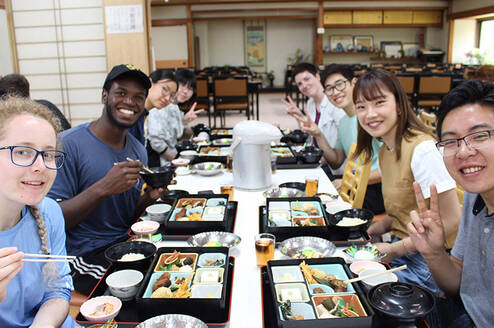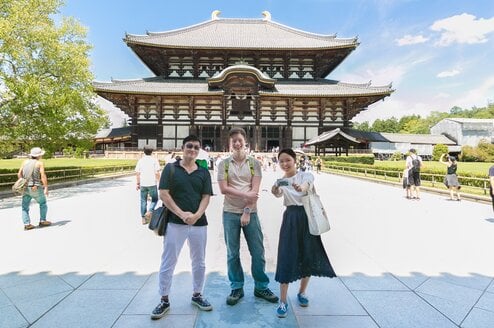Study Abroad Programs in Kyoto, Japan
Study Abroad Programs in Kyoto
About
Become not only a student of the classroom but also a student of the world. By studying abroad in the city of Kyoto, the cultural homeland of Japan, your breaks from the books will be spotting elegant Geishas going about their daily life, explorations of ancient golden temples, and being simply amazed by Kyoto’s peaceful yet opulent vibe.
As a gaijin (foreigner) to Japan you will not be expected to know all of the local customs, however it shows respect and consideration to learn the customs and culture of the destination. While in Japan you have to be overly polite and avoid acting obtuse as they are a culture based on honor and respect. Any effort you make to fit in will be appreciated, so keep the following customs in mind. Ready to study abroad in Kyoto? Tab through our detailed expert guide, read reviews of study abroad programs in Kyoto below and you'll be on your way!
Two articles we recommend reading next are: What to Know Before Studying Abroad in Japan, and How Much Does it Cost to Study Abroad in Japan? After that come back here to continue exploring program options!
Planning Your Trip
Culture and Immersion
- Gift Giving: When you have been invited to a Japanese home it is expected to bring a gift, or omiyage. Gift-giving plays an important role in Japanese culture, so make sure you have something on hand in case you receive an unexpected gift and wish to give something in return.
- Exchanging Business Cards: Every business relationship begins with an exchange of business cards, or meishi. Make sure that the Japanese side of your business card is facing the recipient and expect to receive many cards in return. You should receive a business card with both hands, bowing subtly yet graciously. Read the card with great interest as just simply taking the card and putting it in your pocket or wallet is considered rude.
- Bowing: Entrenched in the Japanese culture is the bow, a strong symbol of respect and gratitude. The Japanese bow is used when you meet and/or part from one another; the type of bow that is used depends on the relationship and social or professional ranking of the people involved.
- Removing Shoes: The removal of outside footwear is expected when entering most buildings including all temples and homes. In some buildings you may be provided with slippers; when changing your footwear, ensure your shoes are pointing away from the door you are about to walk through.
- Eating and Drinking: Before any meal, it is customary to say "Itadakimasu." This translates as “good eating to you,” or “I am starting to eat.” If you are a little rusty on your chopstick skills, start practicing now! You must remember that when finished your meal you place your chopsticks across your dish or on the side as placing them in your bowl is considered disrespectful any time other than at a funeral. If you decide to go out for drinks you will notice that each person takes turns filling the other's glass because filling your own is considered impolite. Even a refusal can’t stop the refreshments, so when you have had enough to drink just leave the glass full.
- Tipping: When in Japan you are not supposed to tip; your server will be insulted and wonder why you are giving them money, as if hinting that their employer does not pay enough.
Culture Shock and Support
As Japan, in general, is a popular foreign study destination, many universities and colleges have on-site programs in place to ease the process of setting in to the life as a Japanese student.
- Orientation: typically organized by the institutions International Centre. Orientation includes information about the intricacies of taking out National Insurance, how to open a bank account, purchase a mobile phone, and so on. You will also find help registering for classes, be given the insider scoop about the university´s various clubs and circles, and briefed on some basic information regarding Japanese manners and customs.
- Resident Assistant: available to you when housing in student accommodations. The Resident Assistant is available to advise about daily life in Japan and show new arrivals around.
- Buddy System: to help you get acclimatized, many Universities will provide a "Buddy", a full-time student selected on the basis of the information you provide about yourself in your application.
- International Community Club: a nonprofit that specializes in legal consultation, daily life support, securing housing, career development and Japanese language courses for foreigners in Kyoto. Details here!
The Kyoto City International Foundation is in place to aid foreign students, allowing them to study worry-free. This is a wonderful resource which will assist in many areas such as apartment hunting, events, tutorials, and volunteering. The Kyoto International Community House (Kokoka) is provided in conjunction with the Foundation and “was opened in 1989 to provide space for interaction and cross-cultural communication between citizens of Kyoto City and people of other cultures. It is a place where people can come together, discuss various ideas, and learn more about each other. To date, more than 5,000,000 people used the facilities and participated in the wide range of activities available at Kyoto International Community House.”
Scholarships
Scholarships: Kyoto
Because studying abroad is an expensive process, it is great to know your scholarship options!
- The JASSO scholarship is funded by the Japanese government and available to students studying abroad for one year in Japan.
- The Bridging Foundation offers a scholarship for study abroad in Japan for American undergraduate students majoring in any field of study. Awards range from $2500-$4000 and are not applicable for summer programs.
- The Freeman-Asia award provides needs-based funding to American students studying in Japan for semester, year, or summer programs.
- More Study Abroad Grants and Scholarships
- Japan’s Ministry of Education, Culture, Sports, Science and Technology has been known to support scholarships awarded to students who are recommended by Japanese embassies or consulates in their home countries; recommendation only comes after a preliminary application process that includes testing.
- If you are interested in the humanities and natural sciences areas, there is a range of majors to choose from such as Japanese studies, architecture or medicine. After a year of intensive Japanese-language study, the Japanese Government Scholarship, or Monbukagakusho, will place you in an appropriate university enabling you to fulfill your goal. A five-year commitment is required for this scholarship.
- For those interested in a more brief study experience, the Association of International Education, Japan (AIEJ) offers The Short-term Student Exchange Promotion Program Scholarship, providing monthly stipends up to one year.
- The Japanese Government and United Nations University have teamed up to lend a hand to those students from scores of designated developing countries. No-interest loans are available through the United Nations University Financial Assistance Program; the amount of the loan will depend on the level and length of study.
Affordability
Any prospective study abroad student eyeing Japan has discovered it’s an expensive option. Luckily, Japan not only offers richly rewarding study experiences but also the means to make them happen. For those serious about studying in Japan there is a myriad of scholarships readily available for students coming from all financial backgrounds. Scholarships range from partial and full-tuition waivers to long-term full-rides. Eligibility and application processes vary, as do whether to apply through your home institution, university, or via a Japanese representative.
For more budget tips we recommend reading How Much Does it Cost to Study Abroad in Japan? and How to Study Abroad in Japan on a Budget.





























